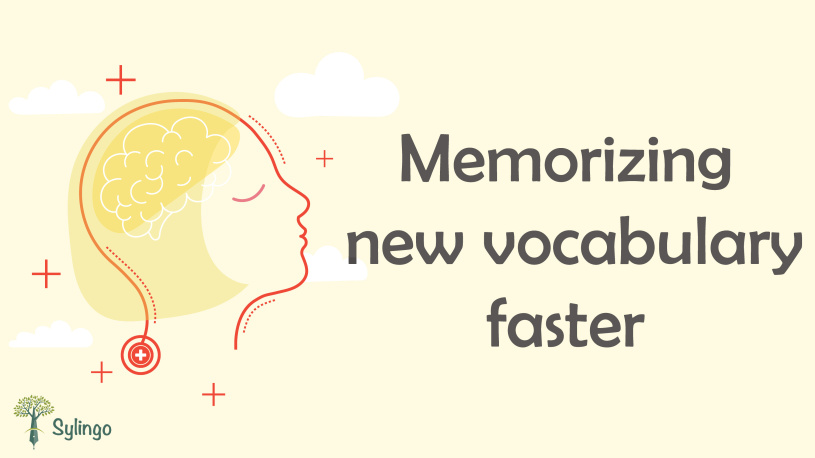When learning a foreign language, we often face the problem of memorizing new words quickly. Thus, being unable to use them in speaking, writing, and comprehending what is said. We often learn, but with no results, because we forget everything after a few days.
Therefore, we need to use scientific and functional methods to memorize new words. We will address in this essay some of the most important and proven tips and techniques to remember new words in a foreign language quickly and permanently.
Numbers of words you should know
First, you should know how many words you need to understand and express yourself in most foreign languages. For example, a 5-year-old child who speaks English uses between 4,000 and 5,000 words, while a graduate uses about 20,000 words. But an English student as a foreigner knows about 5,000 words even after learning the language for several years.
The good news is that 2,000 words are enough to understand about 80% of any foreign language. This conclusion was reached after analyzing The Brown Corpus, “Brown University Standard Corpus of Present-Day American English”. An electronic corpus of American English texts and the first organized text corpus of various genres. Henry Kučera and W. Nelson Francis collected the corpus at Brown University in Rhode Island. It is a general language corpus of 500 samples, with a total of one million words in the English language, and was gathered from the running text of edited English prose printed in the United States in 1961. The original corpus was available on computer tape for the scientific study of the frequency and distribution of word categories in everyday language use.
A language collection is a group of texts that deal with different topics and provide scholars with detailed examples of language use.
If you learn 1,000 new words after the 2,000 words, it helps improve your language comprehension by 3-4%.
Memorizing new words quickly
The common question everyone asks when learning a foreign language is how I can remember new words quickly.
Scientists believe it is easier to memorize information when learning with emotions or when our feelings are positive. So it is a good idea to learn and memorize words through fun tests, playing games, or even watching movies.
If there is a song you like in the foreign language you are learning, you can look up the meanings of the words you do not know and associate them with the song you love. This will create an emotional impact on your memory, memorize them faster, and remember them better.
There are different techniques for learning words. For instance, if you love the traditional ways of studying, you can write the vocabulary to memorize and learn them in a notebook or on stickers and put these stickers on the wall or your desk so that you can see them continuously and recall them.
On the other hand, if you like using new technology, there are specialized sites where you can find different techniques to learn and help you memorize and practice new words. Sylingo is one of the best sites out there. You can add words and terms you want to learn. Also, you can take various beneficial tests to help you remember words quickly and effectively. Since the site has a feature for pronouncing words, you can easily remember the words you are learning with the correct pronunciation, even the difficult ones. The experience of using this site will be brimming with positivity and passion for its simplicity, efficacy, and comfortable use.
Remembering the new words
The repeated scenario with people learning a foreign language is suffering and complaining from memorizing hundreds of new words and forgetting them all after a week. So what is causing this problem, and what is the solution?
The human brain has two types of memory: short-term and long-term memory. Short-term memory allows you to retain information for 15 to 30 minutes. Once you are done with the vocabulary and not using them, your brain forgets what you have learned.
The problem is how to let your brain know you need to remember these words. The trick is to repeat them several times. But how many times do you have to repeat the word before it moves from short-term memory to long-term memory?
Hermann Ebbinghaus, a German psychologist, has developed a treatment for forgetting that explains how brains omit information unless repeated. You will remember only 60% after twenty minutes of learning a list of words, and half of the rest will be forgotten after one hour. Only 20% of the words you learned are memorized after three days. So the information is wasted as time goes on. That is why you should study and rehearse the words every day because one day without practicing makes it more difficult.
In short, repeat the words you learned. It is that simple, but how?
If you are a traditional learner, you can pick a specific time to rehearse and set an alarm on your phone to remind you of that. Whereas, if you study using modern technology, you can use websites, such as Sylingo. This site will send emails to remind you to study and review the words. You should as well use them in your conversations and writing. And try writing a short story using the new words you have learned.
Memorizing and reviewing words program
After learning new words:
- Review after 10-15 minutes.
- Review after 50-60 minutes.
- Review after a day.
- Review after two days.
- Review after three days.
Eventually, you will successfully memorize almost all the words you learned in your long-term memory.
Expressing thoughts faster
We all like to speak a foreign language fluently and spontaneously; without having to think about the structure of each sentence before saying it. It is possible to speak a foreign language faster by growing muscle memory, the muscles you use when speaking, such as fingers or legs. Muscle memory helps to perform movements automatically. It is the same way how the pianists play a piece with their hands.
In order to improve this memory, you need to pronounce and repeat the words loudly when learning them, and focus on the movements of your tongue and lips. Furthermore, think about what the word refers to, what it means, and the context in which you can use it. In time, you do not have to think about which word to use because your muscles will do it for you.
Working on both short-term and long-term memory, besides muscle memory, allows you to expand your vocabulary quickly and memorize new words for always.














